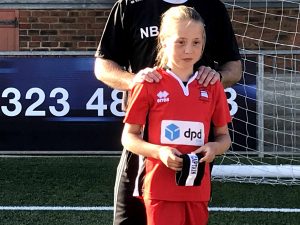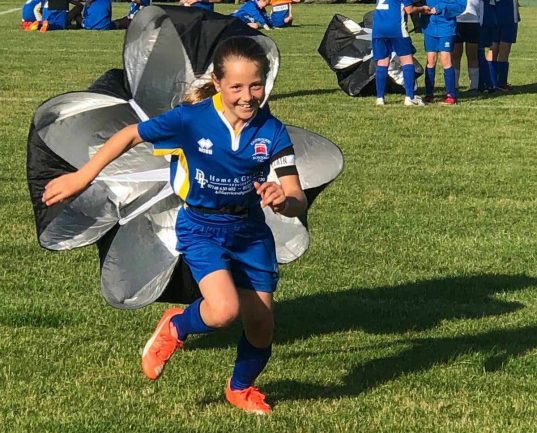Women in Sport reveals boys as young as five have learnt sport is not for girls as it launches bold campaign to challenge gender stereotyping
 New research from charity Women in Sport reveals that ‘sportiness’ is still seen as a fundamental part of a boy’s identity. With this, boys are finding it hard to break free from the expectation that to be masculine they must be good at sport, strong and dominant.
New research from charity Women in Sport reveals that ‘sportiness’ is still seen as a fundamental part of a boy’s identity. With this, boys are finding it hard to break free from the expectation that to be masculine they must be good at sport, strong and dominant.
“When boys are grown up they work and exercise. When girls grow up, they have to stay at home and make food.”
“My uncle said that I have to be 10 times better than girls.”
The report ‘Boys will be Boys’ – Creating a new generation of male allies for girls in sport’, found that when asked directly most boys said that girls are as competent in sport as boys. However, their actions didn’t reflect this. Boys were reluctant to pass the ball to girls, were tougher on girls when they made mistakes, believed teams with mostly boys would win, and doubted girls could be as good at football. There’s clearly a gap between what boys are saying and how they’re acting when it comes to sport.
The research studied the attitudes and behaviours of boys between the ages of 5 and 11 towards girls in sport. The aim was to understand what influences boys at this early age and how to promote more respect towards girls in sport. The study found that stereotyping is still alive and kicking in our society as adults continue to unknowingly pass down stereotypes to boys that limit the lives of girls.
The research also found:
- A lack of female role models reinforces gender stereotypes, shaping boys’ attitudes towards girls in sport, leading to beliefs that girls aren’t interested, aren’t skilled, and don’t belong.
- Stereotyping pushes girls towards more aesthetic activities and restricts certain contact and teamsports to boys widening the skills gap and limiting opportunities for mutual respect.
This stereotyping not only creates a negative environment for those boys who don’t like sport, but critically for the charity it excludes girls from sport, fuelling the myth that girls don’t belong there. Women in Sport wants to de-bunk this myth.
 The charity’s new campaign #WhatsYourLittleOneMadeOf highlights the underlying stereotypes that still exist and their consequences. It is based on the charity’s research into young girls (published last year) and its new research into young boys. The campaign challenges social norms when it comes to the sporting expectations we surround our children with, whether at home, in school or in the community. Women in Sport wants to get the nation talking about gender stereotypes and sport, helping people to recognise and challenge them. We want to break the cycle early and find ways to create a new generation of boys who can be agents of change for girls and women in sport.
The charity’s new campaign #WhatsYourLittleOneMadeOf highlights the underlying stereotypes that still exist and their consequences. It is based on the charity’s research into young girls (published last year) and its new research into young boys. The campaign challenges social norms when it comes to the sporting expectations we surround our children with, whether at home, in school or in the community. Women in Sport wants to get the nation talking about gender stereotypes and sport, helping people to recognise and challenge them. We want to break the cycle early and find ways to create a new generation of boys who can be agents of change for girls and women in sport.
Fronted by social worker and standup comic, Isma Almas and Eastenders actor Max Bowden, the digital campaign creates fictional workshops on ‘How to Create an Insecure Girl’ and ‘How to Create a Sexist Boy’. The campaign uses satirical videos to challenge perceptions and show how societal stereotyping affects young children and was designed for Women in Sport by Ronaldo Taveres with award-winning communications agency Pitch Marketing Group on a pro bono basis.
Women in Sport CEO Stephanie Hilborne said: “We lead our boys to think that masculinity is dependent on being good at sport, being dominant and winning, and then we wonder why they exclude girls in the playground or don’t pass to them in football. This makes girls feel unhappy, puts them off sport and means they lose out on its joy and lifelong benefits. It’s not inevitable that this happens and it’s not acceptable to let it continue. It’s imperative that we undo these stereotypes and foster a culture of mutual respect and understanding. Through our #WhatsYourLittleOneMadeOf campaign, we are on a mission to disrupt the status quo and challenge the societal norms that perpetuate these harmful stereotypes. By creating thought-provoking content, we aim to ignite conversations and drive meaningful change within sport and in society as a whole.”
The charity has created a suite of downloadable resources for schools, community sports coaches and parents to support them with practical tools to avoid stereotypes and create environments that foster mutual respect between boys and girls.
With thanks to Women in Sport










What a great article. Very well written and informative please keep the stories coming.
Thank you.